#( V. Lord Of Fire’s Cleanse || Royal )
Text
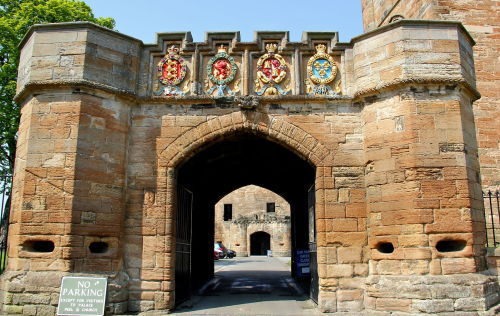
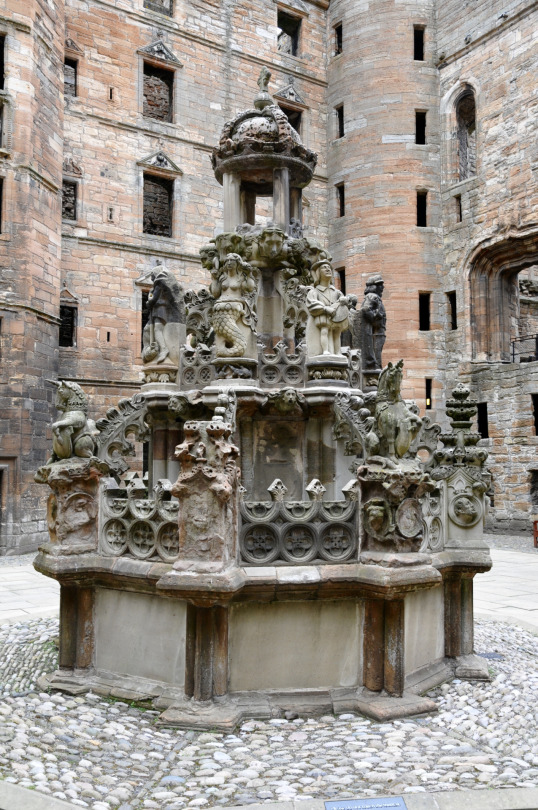
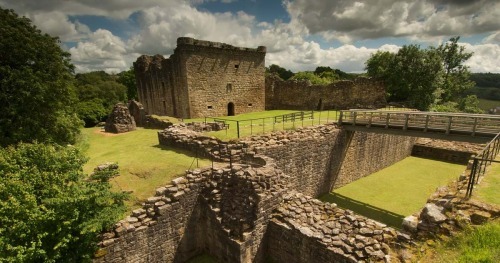
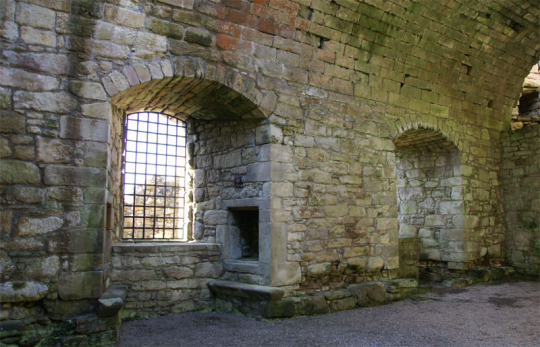
On August 16th 1540 Sir James Hamilton of Finnart was executed.
If ever there was a fall from grace this is it, Hamilton was an architect and noble, known as the ‘Bastard of Arran, back in the day Bastard was not classed as a swear word, it merely meant being illegitimate, in this case he the son of James Hamilton, 1st Earl of Arran. Knighted aged around 17 and seems to have been well thought of, at least by his peers.
If you have visited some of the castles and palaces of Scotland you will have seen Hamilton’s’ work, he is credited with much f the Palace at Falkland you see today, and the Palace at Stirling Castle. He also built Craignethan Castle in South Lanarkshire for himself after being gifted the Craignethan Castle by King James V.
Hamilton was also involved in intrigue and persecution; he murdered John Stuart, the Earl of Lennox, and participated in the oppression of the Protestants, including his own cousin Patrick Hamilton, who was burnt at the stake in 1528. Known for his temper, Hamilton also provoked the infamous 'Clear the Causeway’ skirmish in Edinburgh.
Also called Cleanse the Causeway, the Skirmish was the result of enmity between the House of Hamilton and the “Red” Angus line of the House of Clan Douglas, both powerful noble families jealous of each other’s influence over King James V. The fight went badly for the Hamiltons, and Sir Patrick Hamilton and about 70 others were killed in the incident. The Earl of Arran and Sir James fought their way out, and escaped along a narrow close. Stealing a nearby pack-horse that had come into the city with coals, they fled through the shallows of the Nor Loch marshes.
Having survived this he seems to have still been in a good position of influence in the Royal Court and held the post of Lord Steward of the Royal Household and Master of Works.
For unexplained reasons his fickle King became convinced that Hamilton was plotting against him and, despite there being no evidence to support this, arrested his old friend, some of the evidence the King offered on August 16th 1540 at the trial was from 12 years previous and reads;
“Sir James Hamilton of Finnart, having been convicted of the treasonable shooting of guns and firing of missiles outside the palace of Linlithgow and from the bell-tower of the same, at the king and the people in his company, both at the time the king came to the palace and when he withdrew from the same, and especially at his lodging place in the same town, the king being personally present at the time of the firing of the said missiles. And for art and part in the treasonable imagination, planning, and consultation, vulgarly called devising, of assassinations, at the time it is said he was with Archibald Douglas of Kilspindie and James Douglas of Parkhead at the chapel of St Leonard near Edinburgh, after the forfeiture of Archibald Douglas, formerly Earl of Angus, George Douglas of Pittendreich his brother, and the said Archibald Douglas, his father, and also during the siege of Tantallon Castle in consultation with the said Douglases, how he would enter by the window near the upper part of the bed, 'the bedhead’ (superiorem thori - literally above the pillows), in the King’s palace near Holyrood Abbey, and how there he would commit the slaughter of the King. And for common treason and conspiracy against the King, his realm and lieges. Therefore it was given that this James forfeited his life, lands, rents and possessions to the king as his escheat, to remain with him in perpetuity.”
That is how it read from the record books, they weren’t keen on paragraphs back then!
After losing his head in Edinburgh King James seized his lands, taking the silverwork from the chapel at Craignethan along with a chest of the families paperwork many of which were destroyed by crown officers. Cardinal Beaton gave money to his widow, as she was his relative.
That wasn’t the last the King heard from The Bastard of Arran though, Finnart is said to have appeared to the James V in a dream, and declared that he “would shortly lose both arms, then his head.” This prophecy came true, as the King lost both of his young sons in 1541, and died himself in 1542. The story was recorded by John Knox and George Buchanan.
Wiilliam of Hawthornden and George Buchanan both cited the execution as evidence of arbitrary cruelty and greed in the behaviour of James V, I've said it before that the Stewarts were a ruthless lot. The reasons for Finnart’s execution remain unclear and are still debated between some historians to this day.
Pics are of Linlithgow Palace and Craignethan Castle.
18 notes
·
View notes
Text
Saints&Reading: Fri., Feb. 12, 2021
January 30th_by the New calendar
Basil the Great, Gregory the Theologian and John Chrysostomos.

"Three Saints" – the Assemblage (Sobor, Synaxis) of the Holy OEcumenical Teachers of the Church and Sainted-Hierarchs: Basil the Great, Gregory the Theologian and John Chrysostomos: At Constantinople for a long time there raged disputes about which one of the three sainted-hierarchs should be accorded the primacy of honour. One faction of the people preferred Saint Basil (Comm. 1 January), others stood forth for Saint Gregory the Theologian (Comm. 25 January), while a third reverenced Saint John Chrysostomos (Comm. 13 November).
From this arose among church factions amongst Christians: some called themselves Basilians, others – Gregorians, and the third – Johannites.
In accord with the will of God, in the year 1084 the three sainted-hierarchs appeared to the Euchantine metropolitan John, and in declaring that they were equal before God, they gave orders that the disputes should stop and that a day in common celebration of their memory should be established.
The Monk Zenon (Xeno), Teacher of Saint Basil the Great (414)

The Monk Zenon (Xeno), Teacher of Saint Basil the Great, was born in the city of Pontus into a rich family. He served at the court of the emperor Valens (364-378), amongst the soldiers with whom were sent out the imperial edicts. After the death of Valens Saint Zenon left the world and settled himself in a cave near the city of Antioch. For forty years he asceticised in this cave, and in complete solitude he lived an austere life, cleansing the soul, and occupying himself with meditation on God. The Monk Zenon went each Sunday to church and he communed the Holy Mysteries of Christ. In his cell he had neither bed nor fire-place nor lamp. The ascetic wore old rags, ate only bread and water, for which he had to make a tedious journey into the city to the well. The Monk Zenon was particularly fond of holy books, which he borrowed from those visiting him for spiritual counsel. Through his deep humility the blessed ascetic, filled with the gifts of grace, considered himself poor in spirit. The Monk Zenon died at the beginning of the V Century.
© 1996-2001 by translator Fr. S. Janos.


Greeting to the Elect Pilgrims
1 Peter 1:1-2, 1:10-12, 2: 6-10 NKJV
To the pilgrims of the Dispersion in Pontus, Galatia, Cappadocia, Asia, and Bithynia,2 elect according to the foreknowledge of God the Father, in sanctification of the Spirit, for obedience and sprinkling of the blood of Jesus Christ:
Grace to you and peace be multiplied.
10 Of this salvation the prophets have inquired and searched carefully, who prophesied of the grace that would come to you, 11 searching what, or what manner of time, the Spirit of Christ who was in them was indicating when He testified beforehand the sufferings of Christ and the glories that would follow. 12 To them it was revealed that, not to themselves, but to [e]us they were ministering the things which now have been reported to you through those who have preached the gospel to you by the Holy Spirit sent from heaven—things which angels desire to look into.
6 Therefore it is also contained in the Scripture, “Behold, I lay in ZionA chief cornerstone, elect, precious, And he who believes on Him will by no means be put to shame.”7 Therefore, to you who believe, He is precious; but to those who are disobedient, “The stone which the builders rejected Has become the chief cornerstone,” 8 and “A stone of stumbling And a rock of offense.” They stumble, being disobedient to the word, to which they also were appointed.9 But you are a chosen generation, a royal priesthood, a holy nation, His own special people, that you may proclaim the praises of Him who called you out of darkness into His marvelous light; 10 who once were not a people but are now the people of God, who had not obtained mercy but now have obtained mercy.
Mark 12:1-12 NKJV
The Parable of the Wicked Vinedressers
12 Then He began to speak to them in parables: “A man planted a vineyard and set a hedge around it, dug a place for the wine vat and built a tower. And he leased it to [a]vinedressers and went into a far country. 2 Now at vintage-time he sent a servant to the vinedressers, that he might receive some of the fruit of the vineyard from the vinedressers. 3 And they took him and beat him and sent him away empty-handed. 4 Again he sent them another servant, [b]and at him they threw stones, wounded him in the head, and sent him away shamefully treated. 5 And again he sent another, and him they killed; and many others, beating some and killing some. 6 Therefore still having one son, his beloved, he also sent him to them last, saying, ‘They will respect my son.’ 7 But those [c]vinedressers said among themselves, ‘This is the heir. Come, let us kill him, and the inheritance will be ours.’ 8 So they took him and killed him and cast him out of the vineyard.
9 “Therefore what will the owner of the vineyard do? He will come and destroy the vinedressers, and give the vineyard to others. 10 Have you not even read this Scripture:
‘The stone which the builders rejected
Has become the chief cornerstone.
11 This was the Lord’s doing,
And it is marvelous in our eyes’?”
12 And they sought to lay hands on Him, but feared the multitude, for they knew He had spoken the parable against them. So they left Him and went away.
Source: Bible Gateway
#orthodoxy#orthodox christianity#ancientchristianity#originofchristianity#spirituality#holyscriptures#gospel#sacred texts#wisdom
2 notes
·
View notes
Text
the Word that cleanses us
(inside & out)
because what we do matters. all will be purely Judged by our Creator.
Today’s reading of the Scriptures from the New Testament continues with the Letter of First Peter:
Since the Anointed suffered in the flesh, prepare yourselves to do the same—anyone who has suffered in the flesh for the Lord is no longer in the grip of sin—so that you may live the rest of your life on earth controlled not by earthly desires but by the will of God.
You have already wasted enough time living like those outsiders in the society around you: losing yourselves in sex, in addictions and desires, in drinking and lawless idolatry, in giving your time and allegiance to things that are not godly. When you don’t play the same games they do, they notice that you are living by different rules. That’s why they say such terrible things about you. Someday they, too, will have to give an account of themselves to the One who judges the living and the dead. (This is why the good news had to be brought to those who are dead so that although they are judged in the flesh, they might live in the spirit in the way that pleases God.)
We are coming to the end of all things, so be serious and keep your wits about you in order to pray more forcefully. Most of all, love each other steadily and unselfishly, because love makes up for many faults. Show hospitality to each other without complaint. Use whatever gift you’ve received for the good of one another so that you can show yourselves to be good stewards of God’s grace in all its varieties. If you’re called upon to talk, speak as though God put the words in your mouth; if you’re called upon to serve others, serve as though you had the strength of God behind you. In these ways, God may be glorified in all you do through Jesus the Anointed, to whom belongs glory and power, now and forever. Amen.
Dear ones, don’t be surprised when you experience your trial by fire. It is not something strange and unusual, but it is something you should rejoice in. In it you share the Anointed’s sufferings, and you will be that much more joyful when His glory is revealed. If anyone condemns you for following Jesus as the Anointed One, consider yourself blessed. The glorious Spirit of God rests on you. But none of you should ever merit suffering like those who have murdered or stolen, meddled in the affairs of others or done evil things. But if you should suffer for being a Christian, don’t think of it as a disgrace, as it would be if you had done wrong. Praise God that you’re permitted to carry this name.
For the time for judgment has come, and it is beginning with the household of God. If it is starting with us, what will happen to those who have rejected God’s good news? It is written in Proverbs,
If it is hard for the righteous ones to be saved,
what will happen to the ungodly and the sinners?
So even if you should suffer now for doing God’s will, continue doing good and trust your futures to the judgment and mercy of a faithful Creator.
The Letter of 1st Peter, Chapter 4 (The Voice)
Today’s paired chapter of the Testaments is the 28th chapter of First Chronicles where King David gives his son Solomon the [blueprint] for building the Temple in Jerusalem:
[David’s Valedictory Address]
David called together all the leaders of Israel—tribal administrators, heads of various governmental operations, military commanders and captains, stewards in charge of the property and livestock belonging to the king and his sons—everyone who held responsible positions in the kingdom.
King David stood tall and spoke: “Listen to me, my people: I fully intended to build a permanent structure for the Chest of the Covenant of God, God’s footstool. But when I got ready to build it, God said to me, ‘You may not build a house to honor me—you’ve done too much fighting—killed too many people.’ God chose me out of my family to be king over Israel forever. First he chose Judah as the lead tribe, then he narrowed it down to my family, and finally he picked me from my father’s sons, pleased to make me the king over all Israel. And then from all my sons—and God gave me many!—he chose my son Solomon to sit on the throne of God’s rule over Israel. He went on to say, ‘Your son Solomon will build my house and my courts: I have chosen him to be my royal adopted son; and I will be to him a father. I will guarantee that his kingdom will last if he continues to be as strong-minded in doing what I command and carrying out my decisions as he is doing now.’
“And now, in this public place, all Israel looking on and God listening in, as God’s people, obey and study every last one of the commandments of your God so that you can make the most of living in this good land and pass it on intact to your children, insuring a good future.
“And you, Solomon my son, get to know well your father’s God; serve him with a whole heart and eager mind, for God examines every heart and sees through every motive. If you seek him, he’ll make sure you find him, but if you abandon him, he’ll leave you for good. Look sharp now! God has chosen you to build his holy house. Be brave, determined! And do it!”
Then David presented his son Solomon with the plans for The Temple complex: porch, storerooms, meeting rooms, and the place for atoning sacrifice. He turned over the plans for everything that God’s Spirit had brought to his mind: the design of the courtyards, the arrangements of rooms, and the closets for storing all the holy things. He gave him his plan for organizing the Levites and priests in their work of leading and ordering worship in the house of God, and for caring for the liturgical furnishings. He provided exact specifications for how much gold and silver was needed for each article used in the services of worship: the gold and silver Lampstands and lamps, the gold tables for consecrated bread, the silver tables, the gold forks, the bowls and the jars, and the Incense Altar. And he gave him the plan for sculpting the cherubs with their wings outstretched over the Chest of the Covenant of God—the cherubim throne. “Here are the blueprints for the whole project as God gave me to understand it,” David said.
David continued to address Solomon: “Take charge! Take heart! Don’t be anxious or get discouraged. God, my God, is with you in this; he won’t walk off and leave you in the lurch. He’s at your side until every last detail is completed for conducting the worship of God. You have all the priests and Levites standing ready to pitch in, and skillful craftsmen and artisans of every kind ready to go to work. Both leaders and people are ready. Just say the word.”
The Book of 1st Chronicles, Chapter 28 (The Message)
my personal reading of the Scriptures for Wednesday, january 27 of 2021 with a paired chapter from each Testament of the Bible, along with Today’s Psalms and Proverbs
A post by John Parsons about the “fruit” we bear from the seed of the Spirit & Word within:
The Fruit of Spirit - פרי הרוח
Traditional Judaism identifies various middot ha-lev (qualities of heart) that attend to a genuinely Jewish life. Among others these include Talmud Torah (studying Scripture), ahavat Adonai (loving God), gemilut chasidim (doing works of compassion), bikkur cholim (visiting the sick), and so on. The follower of Yeshua likewise is intended to evidence middot hav-lev, though the Source for such comes directly from the power of the Ruach Ha-Kodesh (Holy Spirit) working within the heart of faith. The priot (fruits) listed in Galatians 5:22-23 represent nine visible attributes of a true follower of Yeshua, namely: love (אהבה), joy (שׂמחה), peace (שׁלום), patience (סבלנות), generosity (נדיבות לב), kindness (חסד), faithfulness (נֶאֱמָנוּת), humility (ענוה), and modesty (צְנִיעוּת).
Note that these priot are not realized through self-effort or attempts at human “reformation,” but rather are a supernatural outgrowth of the grace and love of God in the life of one who puts their trust in Yeshua as Savior. They are fruits of the Spirit (פּרי הרוח). See John 15:1-8. Our lives are sanctified in the manner in which they were initially justified: wholly by faith in the love and grace of God...
The tough question we need to ask ourselves is whether our lives give evidence to the power and agency of the Holy Spirit within us. Strictly speaking, these nine attributes are qualities that only God Himself possesses, since He alone is perfectly loving, perfectly joyful, and so on. But since we are created be’tzelem elohim (in the image of God) and were given the Holy Spirit to help us resemble our Teacher (Luke 6:40), spiritual fruit should be seen in our own lives (John 14:12; 15:1-8; 26-7). Obtaining such fruit is invariably a matter of faith - trusting that God will help us live our lives in truthful union with Him.
Let’s remember to pray for one another and ask the LORD to make each of us fruitful l'shem shamayim - for the sake of the Name of our beloved One. [Hebrew for Christians]

https://hebrew4christians.com/
1.26.21 • Facebook
Today’s message from the Institute for Creation Research
January 27, 2021
Delivered by the Word
“Consider mine affliction, and deliver me: for I do not forget thy law. Plead my cause, and deliver me: quicken me according to thy word.” (Psalm 119:153-154)
Much of the Old Testament records God’s intervention into the affairs of men, often in huge victories on the battlefield. The great military king David wrote frequently of his deliverance amid slaughter, and certainly there is an overtone of physical deliverance felt in these verses.
The key to this prayer, however, is in verse 158: “I beheld the transgressors, and was grieved; because they kept not thy word.” Although the psalmist spoke of his many “persecutors and...enemies” (v. 157), his desire was fixed directly on the faithfulness of God’s promises. Note the constant reliance on the truth of what God has said:
“I do not forget thy law” (v. 153). God spoke of the opposite condition through Hosea: “My people are destroyed for lack of knowledge” (Hosea 4:6).
“Quicken me according to thy word” (v. 154), for the “wicked...seek not thy statutes” (v. 155).
Even though there are many enemies who persecuted him “without cause” (Psalm 35:7), this godly man would not “decline from thy testimonies” (Psalm 119:157).
“I beheld the transgressors, and was grieved; because they kept not thy word” (v. 158). Jesus felt the same righteous emotion when He “looked round about on them with anger, being grieved for the hardness of their hearts” (Mark 3:5).
Hearts not stirred with the Holy Spirit’s indignation at the wicked culture and flagrant violators of God’s Word should “give diligence to make your calling and election sure” (2 Peter 1:10). Those who love God’s holiness also love God’s Word. HMM III
1 note
·
View note
Photo
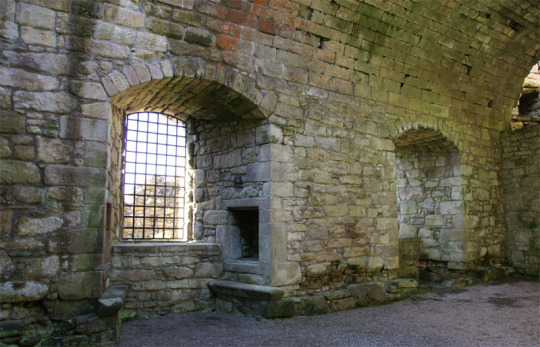
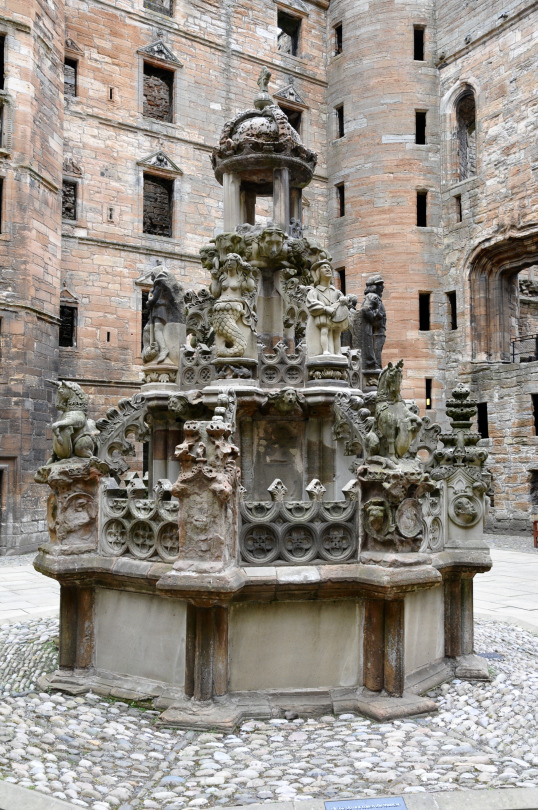
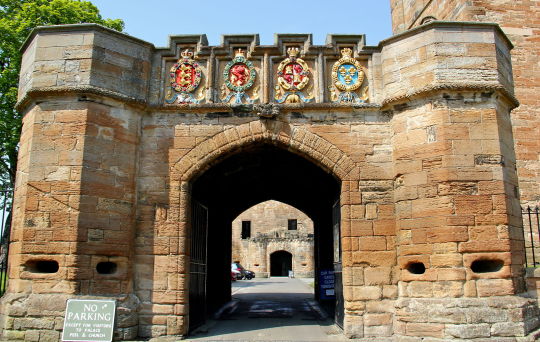
On August 16th 1540 architect Sir James Hamilton of Finnart was executed.
James Hamilton of Finnart was the eldest of the 1st Earl of Arran 2nd Duke of Hamilton whose family seat was Brodick Castle Arran. Arran had no son from his first marriage, hence Finnart was illegitimate via an affair with Mary Boyd, hence he became known as the ‘Bastard of Arran, back in the day Bastard was not classed as a swear word, it merely meant being illegitimate
If you have visited some of the castles and palaces of Scotland you will have seen Hamilton’s’ work, he is credited with much f the Palace at Falkland you see today, and the Palace at Stirling Castle. He also built Craignethan Castle in South Lanarkshire for himself after being gifted the Craignethan Castle by King James V.
Hamilton was also involved in intrigue and persecution; he murdered John Stuart, the Earl of Lennox, and participated in the oppression of the Protestants, including his own cousin Patrick Hamilton, who was burnt at the stake in 1528. Known for his temper, Hamilton also provoked the infamous 'Clear the Causeway’ skirmish in Edinburgh.
Also called Cleanse the Causeway, the Skirmish was the result of enmity between the House of Hamilton and the “Red” Angus line of the House of Clan Douglas, both powerful noble families jealous of each other’s influence over King James V. The fight went badly for the Hamiltons, and Sir Patrick Hamilton and about 70 others were killed in the incident. The Earl of Arran and Sir James fought their way out, and escaped along a narrow close. Stealing a nearby pack-horse that had come into the city with coals, they fled through the shallows of the Nor Loch marshes.
Having survived this he seems to have still been in a good position of influence in the Royal Court and held the post of Lord Steward of the Royal Household and Master of Works.
For unexplained reasons his fickle King became convinced that Hamilton was plotting against him and, despite there being no evidence to support this, arrested his old friend, some of the evidence the King offered on August 16th 1540 at the trial was from 12 years previous and reads;
“Sir James Hamilton of Finnart, having been convicted of the treasonable shooting of guns and firing of missiles outside the palace of Linlithgow and from the bell-tower of the same, at the king and the people in his company, both at the time the king came to the palace and when he withdrew from the same, and especially at his lodging place in the same town, the king being personally present at the time of the firing of the said missiles. And for art and part in the treasonable imagination, planning, and consultation, vulgarly called devising, of assassinations, at the time it is said he was with Archibald Douglas of Kilspindie and James Douglas of Parkhead at the chapel of St Leonard near Edinburgh, after the forfeiture of Archibald Douglas, formerly Earl of Angus, George Douglas of Pittendreich his brother, and the said Archibald Douglas, his father, and also during the siege of Tantallon Castle in consultation with the said Douglases, how he would enter by the window near the upper part of the bed, 'the bedhead’ (superiorem thori - literally above the pillows), in the King’s palace near Holyrood Abbey, and how there he would commit the slaughter of the King. And for common treason and conspiracy against the King, his realm and lieges. Therefore it was given that this James forfeited his life, lands, rents and possessions to the king as his escheat, to remain with him in perpetuity.”
That is how it read from the record books, they weren’t keen on paragraphs back then!
After losing his head in Edinburgh King James seized his lands, taking the silverwork from the chapel at Craignethan along with a chest of the families paperwork many of which were destroyed by crown officers. Cardinal Beaton gave money to his widow, as she was his relative.
That wasn’t the last the King heard from The Bastard of Arran though, Finnart is said to have appeared to the James V in a dream, and declared that he “would shortly lose both arms, then his head.” This prophecy came true, as the King lost both of his young sons in 1541, and died himself in 1542. The story was recorded by John Knox and George Buchanan.
William of Hawthornden and George Buchanan both cited the execution as evidence of arbitrary cruelty and greed in the behaviour of James V. The reasons for Finnart’s execution remain unclear and are still debated between some historians to this day.
No pics of our subject survive, the first pic is the hall Hamilton of Finnart built for himself at Craignethan Castle, and, for me, his most interesting work, Linlithgow Palace fountain and gatehouse
25 notes
·
View notes
Photo
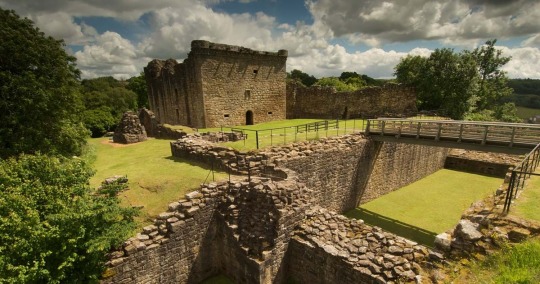
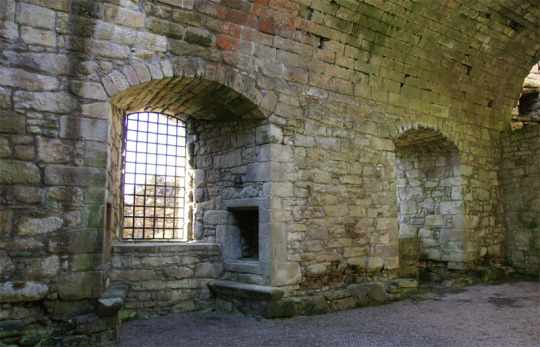
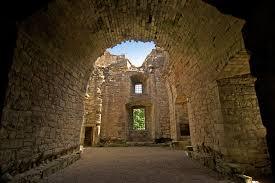
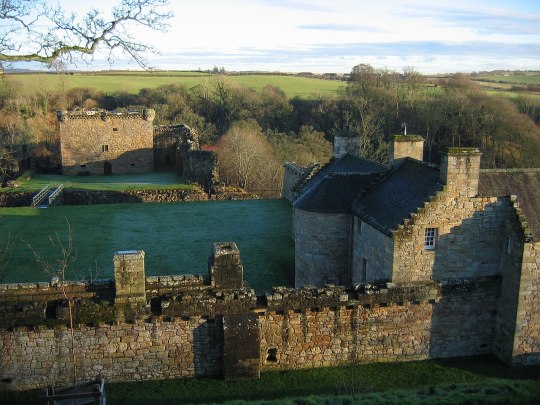
On August 16th 1540 Sir James Hamilton of Finnart was executed.
If ever there was a fall from grace this is it, Hamilton was an architect and noble, known as the 'Bastard of Arran, back in the day Bastard was not classed as a swear word, it merely meant being illegitimate, in this case he the son of James Hamilton, 1st Earl of Arran. Knighted aged around 17 and seems to have been well thought of, at least by his peers.
If you have visited some of the castles and palaces of Scotland you will have seen Hamilton's' work, he is credited with much f the Palace at Falkland you see today, and the Palace at Stirling Castle. He also built Craignethan Castle in South Lanarkshire for himself after being gifted the Craignethan Castle by King James V.
Hamilton was also involved in intrigue and persecution; he murdered John Stuart, the Earl of Lennox, and participated in the oppression of the Protestants, including his own cousin Patrick Hamilton, who was burnt at the stake in 1528. Known for his temper, Hamilton also provoked the infamous 'Clear the Causeway' skirmish in Edinburgh.
Also called Cleanse the Causeway, the Skirmish was the result of enmity between the House of Hamilton and the "Red" Angus line of the House of Clan Douglas, both powerful noble families jealous of each other's influence over King James V. The fight went badly for the Hamiltons, and Sir Patrick Hamilton and about 70 others were killed in the incident. The Earl of Arran and Sir James fought their way out, and escaped along a narrow close. Stealing a nearby pack-horse that had come into the city with coals, they fled through the shallows of the Nor Loch marshes.
Having survived this he seems to have still been in a good position of influence in the Royal Court and held the post of Lord Steward of the Royal Household and Master of Works.
For unexplained reasons his fickle King became convinced that Hamilton was plotting against him and, despite there being no evidence to support this, arrested his old friend, some of the evidence the King offered on August 16th 1540 at the trial was from 12 years previous and reads;
"Sir James Hamilton of Finnart, having been convicted of the treasonable shooting of guns and firing of missiles outside the palace of Linlithgow and from the bell-tower of the same, at the king and the people in his company, both at the time the king came to the palace and when he withdrew from the same, and especially at his lodging place in the same town, the king being personally present at the time of the firing of the said missiles. And for art and part in the treasonable imagination, planning, and consultation, vulgarly called devising, of assassinations, at the time it is said he was with Archibald Douglas of Kilspindie and James Douglas of Parkhead at the chapel of St Leonard near Edinburgh, after the forfeiture of Archibald Douglas, formerly Earl of Angus, George Douglas of Pittendreich his brother, and the said Archibald Douglas, his father, and also during the siege of Tantallon Castle in consultation with the said Douglases, how he would enter by the window near the upper part of the bed, 'the bedhead' (superiorem thori - literally above the pillows), in the King's palace near Holyrood Abbey, and how there he would commit the slaughter of the King. And for common treason and conspiracy against the King, his realm and lieges. Therefore it was given that this James forfeited his life, lands, rents and possessions to the king as his escheat, to remain with him in perpetuity."
That is how it read from the record books, they weren't keen on paragraphs back then!
After losing his head in Edinburgh King James seized his lands, taking the silverwork from the chapel at Craignethan along with a chest of the families paperwork many of which were destroyed by crown officers. Cardinal Beaton gave money to his widow, as she was his relative.
That wasn't the last the King heard from The Bastard of Arran though, Finnart is said to have appeared to the James V in a dream, and declared that he "would shortly lose both arms, then his head." This prophecy came true, as the King lost both of his young sons in 1541, and died himself in 1542. The story was recorded by John Knox and George Buchanan.
Wiilliam of Hawthornden and George Buchanan both cited the execution as evidence of arbitrary cruelty and greed in the behaviour of James V. The reasons for Finnart's execution remain unclear and are still debated between some historians to this day.
Pics are of Craignethan Castle.
18 notes
·
View notes